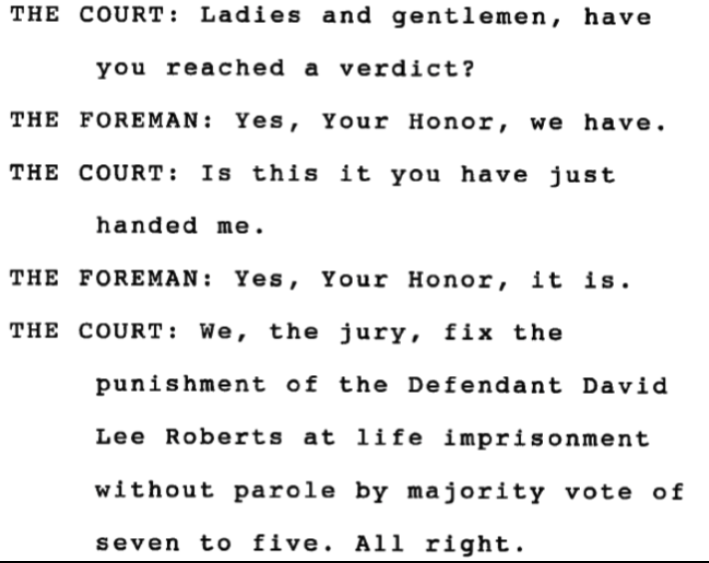A Case for Clemency
Unconstitutional Conditions on Alabama’s Death Row
Mr. Roberts arrived at Holman Correctional Facility as a death-sentenced inmate in 1994. Even then, his severe mental illness made him prone to manic, depressive, and psychotic episodes. Although it was obvious that he needed qualified caregivers to identify these cardinal symptoms of severe mental illness and consistent mental health treatment beyond medication, he got neither.
The State of Alabama filed a motion seeking to set an execution date for Mr. Roberts. His legal team and family are appealing to Governor Kay Ivey for clemency, citing his mental illness, the flawed trial process, and the jury’s original sentencing recommendation.
As a person with severe mental illness1, David has suffered for decades under unconstitutional conditions on Alabama’s death row. From the outset, David has endured what a federal judge recently described as “horrendously inadequate” care for his mental illness because of systemic failures in the Department of Corrections (DOC).2
David's DOC records (displayed below) show he was severally mentally ill upon his arrival at death row and that he continues to be so. DOC mental health professionals have consistently observed that he is floridly psychotic, in response to their assessments that he is experiencing paranoid delusions and auditory hallucinations. For last 20 years or so, the prison has used anti-psychotic medications to manage these symptoms. Even with medication, David has attempted suicide several times. Because he experiences delusions, hallucinations, and mood volatility, prison officials have kept him in solitary confinement for many years, which further deteriorates his mental health.
According to the United States Supreme Court, retribution and deterrence are the “two principal social purposes” served by capital punishment.3 However, neither of them justifies the execution of individuals with severe mental illness.
As the Supreme Court noted in Atkins v. Virginia, “[w]ith respect to retribution—the interest in seeing that the offender gets his ‘just desserts’—the severity of the appropriate punishment necessarily depends on the culpability of the offender.”4
There is reasonable likelihood that David’s severe, inherited mental illness renders him incompetent to be executed. As the Supreme Court observed, “the death penalty has little deterrent force against defendants who have reduced capacity for considered choice.”5
“I Think Mr. Roberts Clearly Should be Assessed for Competency for Execution.”
— Arthur Shechet, Ph.D., Licensed Psychologist
From the Jury: in Their Own Words
“I voted for life without parole. I believe David should have gotten that or at least a life sentence. The truth of the matter is most of us on the jury were people with scarred pasts bunch of us would be dead if we were executed for wrong doings.”
Robert Cashion, Juror
“It remains my belief that Mr. Roberts deserves the life without parole sentence that the jury decided to give him. [I] endorse his request for clemency and urge you, Governor to commute his death sentence to life in prison without parole.”
Cynthia Nichols, Juror
“I believe that Mr. Roberts deserves clemency and should get the life without parole sentence that the jury voted to give him.”
Daniel Pierce, Juror
“I Voted for Life Without Parole.”
Severe Mental Illness: a Continued Decline
Case notes from mental health professionals at the Alabama Department of Corrections, as well as Health Service Requests from David himself, document David’s continued mental decline while on death row.
Sources
According to the American Psychological Association, severe mental illness “refers to mental disorders that carry certain diagnoses, such as schizophrenia, bipolar disorder, and major depression; that are relatively persistent (e.g., lasting at least a year); and that result in comparatively severe impairment in major areas of functioning.” Assessment and Treatment of Serious Mental Illness, American Psychological Association, at 5 (Aug. 2009), https://www.apa.org/practice/ resources/smi-proficiency.pdf.
Braggs v. Dunn, 383 F. Supp. 3d 1218, 1227 (M.D. Ala. 2019) (“ADOC's inadequate crisis care and long-term suicide-prevention measures have created a substantial risk of serious harm, including self-harm, suicide, and continued pain and suffering.”)
Gregg v. Georgia, 428 U.S. 153, 183 (1976).
Atkins v. Virginia, 536 U.S. 304, 319 (2002).
Skipper v. South Carolina, 476 U.S. 1, 13 (1986) (Powell, J., concurring).





